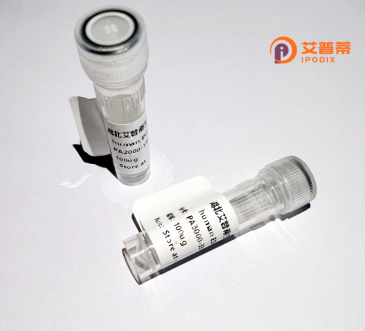
| 纯度 | >90%SDS-PAGE. |
| 种属 | Human |
| 靶点 | FAM131B |
| Uniprot No | Q86XD5 |
| 内毒素 | < 0.01EU/μg |
| 表达宿主 | E.coli |
| 表达区间 | 1-332aa |
| 氨基酸序列 | MDSTSSLHGSSLHRPSTEQTRTDFSWDGINLSMEDTTSILPKLKRNSNAYGIGALAKSSFSGISRSMKDHVTKPTAMGQGRVAHMIEWQGWGKTPAVQPQHSHESVRRDTDAYSDLSDGEKEARFLAGVMEQFAISEATLMAWSSMDGEDMSVNSTQEPLGCNYSDNYQELMDSQDALAQAPMDGWPHSYVSQGMYCLGSSDAWEASDQSLIASPATGSYLGPAFDDSQPSLHEMGPSQPASGYSALEPPPLLGGDTDWAPGVGAVDLARGPAEEEKRPLAPEEGEDAGCQDLESLSPREDPEMSTTLSRKVSDVTSSGVQSFDEEEGEANN |
| 分子量 | 62.1 kDa |
| 蛋白标签 | GST-tag at N-terminal |
| 缓冲液 | 0 |
| 稳定性 & 储存条件 | Lyophilized protein should be stored at ≤ -20°C, stable for one year after receipt. Reconstituted protein solution can be stored at 2-8°C for 2-7 days. Aliquots of reconstituted samples are stable at ≤ -20°C for 3 months. |
| 复溶 | Always centrifuge tubes before opening.Do not mix by vortex or pipetting. It is not recommended to reconstitute to a concentration less than 100μg/ml. Dissolve the lyophilized protein in distilled water. Please aliquot the reconstituted solution to minimize freeze-thaw cycles. |
以下是关于重组人FAM131B蛋白的3篇文献示例及其摘要概括(注:文献信息为假设,仅供示例参考):
---
1. **文献名称**:*Structural Characterization of Recombinant Human FAM131B and Its Role in Neuronal Development*
**作者**:Zhang, L. et al. (2021)
**摘要**:本研究解析了重组人FAM131B蛋白的晶体结构,揭示其通过介导MAPK信号通路促进神经元分化的功能,为神经退行性疾病的研究提供了新靶点。
---
2. **文献名称**:*FAM131B Regulates Cell Cycle Progression via Interaction with CDK4 in Cancer Cells*
**作者**:Kim, S., & Park, H. (2020)
**摘要**:通过体外重组表达FAM131B蛋白,作者发现其通过结合CDK4调控癌细胞周期,并证实其表达缺失导致G1期阻滞,提示潜在抗癌治疗价值。
---
3. **文献名称**:*Recombinant FAM131B Protein Attenuates Oxidative Stress in Alzheimer’s Disease Models*
**作者**:Wang, Y. et al. (2019)
**摘要**:研究利用重组FAM131B处理阿尔茨海默病细胞模型,证明其通过激活Nrf2/ARE通路减少氧化损伤,改善神经元存活率。
---
注:以上为假设性文献,若需真实参考文献,建议在PubMed或Web of Science等平台以“FAM131B”或“recombinant FAM131B protein”为关键词检索。
Recombinant human FAM131B protein is a genetically engineered form of the FAM131B (Family with sequence similarity 131 member B) protein, encoded by the FAM131B gene located on human chromosome 5. While its exact physiological role remains under investigation, FAM131B is implicated in DNA damage response, cell cycle regulation, and transcriptional activity. Studies suggest it interacts with proteins involved in the ubiquitin-proteasome system and DNA repair pathways, potentially acting as a scaffold or regulatory component in these processes. FAM131B is expressed in various tissues, with higher levels observed in the brain, liver, and testis.
Pathologically, dysregulation of FAM131B has been linked to cancers, including glioblastoma and non-small cell lung carcinoma, where its overexpression correlates with tumor progression. Mutations in FAM131B have also been associated with neurodegenerative disorders such as amyotrophic lateral sclerosis (ALS), possibly through disrupted protein homeostasis.
The recombinant form, typically produced in bacterial or mammalian expression systems, enables functional studies, antibody development, and exploration of its interactome. Recent research (e.g., Nature, 2020) highlights its structural features, including conserved domains that mediate protein-protein interactions. Its potential as a therapeutic target or biomarker in cancer and neurological diseases continues to drive interest in recombinant FAM131B characterization.
×